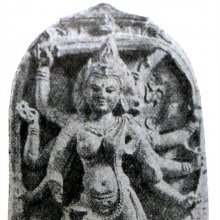Mish, Miś, Miṣ: 10 definitions
Introduction:
Mish means something in Hinduism, Sanskrit, Hindi. If you want to know the exact meaning, history, etymology or English translation of this term then check out the descriptions on this page. Add your comment or reference to a book if you want to contribute to this summary article.
Mish has 8 English definitions available.
The Sanskrit terms Miś and Miṣ can be transliterated into English as Mis or Mish, using the IAST transliteration scheme (?).
Images (photo gallery)
Languages of India and abroad
Sanskrit dictionary
[Deutsch Wörterbuch]
Source: Cologne Digital Sanskrit Dictionaries: Böhtlingk and Roth Grosses Petersburger WörterbuchMiś (मिश्):—1. mischen in miśra, miśla, 1. mikṣ .
--- OR ---
Miś (मिश्):—2. , meśati summen (auch zürnen) [DHĀTUP. 17, 74.] — Vgl. maś .
--- OR ---
Miṣ (मिष्):—
--- OR ---
Miṣ (मिष्):—2. , meṣati besprengen, befeuchten (secane) [DHĀTUP. 17, 48.]
--- OR ---
Mis (मिस्):—, misyati [das 2, 14] unter den Verben der Bewegung.
--- OR ---
Miṣ (मिष्):—1. mit prod erblühen so v. a. sich erheben, entstehen: pronmiṣatpāṇḍuracchavi [Kathāsaritsāgara 90, 67.] — ni, tvatkṛte ca nimiṣyanti (fut.) cakṣūṃṣi [Rāmāyaṇa 7, 57, 16.] nimeṣadharmaṃ prāpsyanti Comm.
--- OR ---
Miṣ (मिष्):—1. mit samud Verglänzen, aufstrahlen: bodhidīpaḥ samunmiṣet [Hemacandra] [Yogaśāstra 4, 110.] — ni, nimiṣita n. nom. act. [Patañjali] [?a. a. O.8,25,b.]
Source: Cologne Digital Sanskrit Dictionaries: Sanskrit-Wörterbuch in kürzerer FassungMiś (मिश्):—, meśati ( śabde , roṣkṛte).
--- OR ---
Miṣ (मिष्):—1. , miṣati —
1) die Augen aufschlagen , — offen haben. Nur Partic. praes ; am häufigsten der Gen. mit einem Subst. in der Bed. im Angesicht von , vor Augen des und des. —
2) spardhāyām. Woher diese Bed. mit Uebergehung der ersten im [Dhātupāṭha] ? — Mit ud —
1) die Augen aufschlagen. Einmal unmiṣamāṇa. —
2) sich öffnen (von den Augen und von Knospen). unmiṣita geöffnet , aufgeblüht. —
3) sich öffnen vom Gesicht , so v.a. sich zum Lächeln verziehen. Nur unmiṣita. —
4) erglänzen , aufstrahlen. —
5) erblühen , so v.a. sich entfalten , sich erheben , entstehen. — Mit prod erblühen , so v.a. sich erheben , entstehen. — Mit pratyud sich erheben oder erglänzen. — Mit samud —
1) sich erheben aus (Abl.). —
2) erglänzen , aufstrahlen. — Mit ni —
1) das Augenlid schliessen , einnicken. —
2) sich schliessen (von den Augen). nimiṣyanti (Fut.!) [Rāmāyaṇa]
--- OR ---
Miṣ (मिष्):—2. , meṣati ( secane).
--- OR ---
Mis (मिस्):—, misyati ( gatikarman)
Sanskrit, also spelled संस्कृतम् (saṃskṛtam), is an ancient language of India commonly seen as the grandmother of the Indo-European language family (even English!). Closely allied with Prakrit and Pali, Sanskrit is more exhaustive in both grammar and terms and has the most extensive collection of literature in the world, greatly surpassing its sister-languages Greek and Latin.
See also (Relevant definitions)
Starts with (+124): Misha, Mishadhanya, Mishala, Mishamishay, Mishamishaya, Mishamishayate, Mishamitita, Mishamlita, Mishan, Mishana, Mishannu, Mishara, Misharuka, Mishat, Mishi, Mishi quiro, Mishika, Mishikri, Mishinnu, Mishisalai.
Ends with: Amish, Animish, Aramish, Gilgamish, Kishmish, Nimish, Niramish, Pratyumish, Samish, Samumish, Udmish, Unmish.
Full-text (+129): Misha, Nimish, Vinimesha, Unmesha, Unmeshana, Unmisha, Unmish, Memisha, Kapatashraya, Mishta, Kalameshika, Nimisa, Unmishita, Mis-mis, Bhanudatta, Pratyumish, Bahattara-khodi, Mishla, Mesha, Nimisati.
Relevant text
Search found 54 books and stories containing Mish, Miś, Mis, Miṣ; (plurals include: Mishes, Miśs, Mises, Miṣs). You can also click to the full overview containing English textual excerpts. Below are direct links for the most relevant articles:
Mandukya Upanishad (Gaudapa Karika and Shankara Bhashya) (by Swami Nikhilananda)
Mandukya Karika, verse 1.11 < [Chapter I - Agama Prakarana (Scripture)]
Mandukya Karika, verse 1.12 < [Chapter I - Agama Prakarana (Scripture)]
Mandukya Karika, verse 1.14 < [Chapter I - Agama Prakarana (Scripture)]
Manusmriti with the Commentary of Medhatithi (by Ganganatha Jha)
Verse 5.15 < [Section II - Objectionable Food]
Verse 4.170 < [Section XIV - Other Duties]
Verse 9.246-247 < [Section XXXIII - Disposal of the Fine realised from the Worst Offenders]
The Bhikkhus Rules (by Bhikkhu Ariyesako)
Bhikkhus And Wealth < [Chapter 3 - Possessions And Offerings]
Vastu-shastra (5): Temple Architecture (by D. N. Shukla)
Jnaneshwari (Bhavartha Dipika) (by Ramchandra Keshav Bhagwat)
Verse 4.17 < [Chapter 4 - Brahma-yajna]
Verse 11.44 < [Chapter 11 - Vishvarupa-darshana-yoga]
Tiruvaymoli (Thiruvaimozhi): English translation (by S. Satyamurthi Ayyangar)
Pasuram 5.9.10 < [Section 9 - Ninth Tiruvaymoli (Man ey nokku)]
Pasuram 4.6.10 < [Section 6 - Sixth Tiruvaymoli (Tirpparai yam ini)]
Pasuram 3.9.5 < [Section 9 - Ninth Tiruvaymoli (Connal Virotam)]



